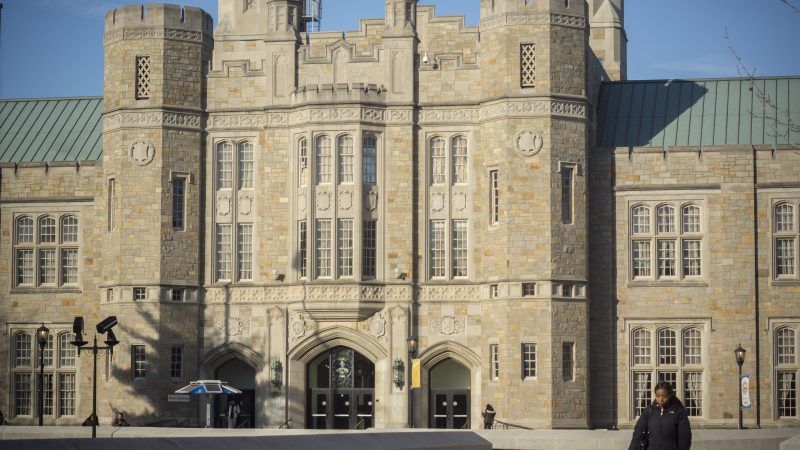Elizabeth Warren's Plan for Free College Tuition Would Punish Hard Work, Increase National Debt
Americans are paying more than ever for car loans. Why shouldn't the government bail those out too? For the same reason eliminating student loans would be a bad idea.

Americans need a car in our road-dependent society, but the cost of the average vehicle has soared into the mid-30s. Payments are pushing $600 a month, leaving many people strapped to afford housing, food and other necessities. The simple answer is for the feds to pay off their car loans and provide free vehicles to everyone who wants one.
Before you hit send on your angry email, realize that I'm making this modest proposal with my tongue planted in my cheek and just for illustrative purposes. Sometimes it takes an absurd idea to illustrate the stupidity of a serious one. These days, Democratic presidential candidates are touting their plans to forgive most student debt and to provide wannabe college students with "free" tuition. They appear to be completely serious about it.
Former students crushed by loan debt might find the idea appealing. It also sounds great to families with teenagers who are approaching their college years. Recent surveys show broad public support for the plan floated by Sen. Elizabeth Warren (D–Mass.), who has vowed to cancel student loan debt up to $50,000 for lower-income students and tax billionaires to fund the $1.25 trillion cost for making tuition at public universities complimentary.
But this column isn't about debt spending, which is a huge problem but one that makes the public's eyes glaze over. In March, the federal government racked up the largest monthly budget deficit in history ($234 billion) and federal debt levels have soared to $22 trillion. Most of us can't fathom a trillion, which might explain our society's collective shrug even as we are busy spending our grandchildren's inheritance.
Instead, this column is about the unforeseen consequences of doing morally hazardous things. If the government wiped away Americans' car-loan debt, it would reward people who spent 70-large on one of those leather-clad monster trucks with a pickup bed used mainly for trips to Ikea. It would punish people who had more impulse control, squirreled away savings, and chose to get around in a 12-year old Civic or the Metro bus.
The Warren plan would hike demand for vehicles, which would first lead to shortages and then to rising prices. If other people are paying, why save up or shop on Craigslist for a beater? Inflation is a problem mainly in industries where there are third-party payers (insurers or government), such as health care. We don't comparison shop for that colonoscopy.
As usual, political leaders are great at pinpointing a serious problem, and then coming up with solutions that will make it even worse. Student debt levels have hit $1.5 trillion. Analysts have warned of a student debt bubble. I agree with writer Robert Farrington, who noted in Forbes that it's unlikely to pop: "In the housing crisis, if a borrower struggles to pay their mortgage, the bank can foreclose on their house." But banks can't repossess a college education, so it becomes a years-long drag on household spending and the economy.
Easy student loans and vast amounts of state and federal subsidies have turned into a funding spigot for public and private universities, which—and this should be no surprise—have not always spent the money wisely. The free-flowing cash caused universities to create Byzantine administrative bureaucracies. Check out the size of the University of California's Office of the President.
It enabled them to construct new departments specializing in potentially interesting but questionable pursuits revolving around race, gender and sexuality. I'm skeptical that many people would pop for a $200,000 degree on the sociology of surfing or oppression studies if they were paying from their own bank account. Fortunately, Walmart always seems to be hiring.
In the 1990s, universities went on a spending binge just as government started expanding its student-aid programs. They built luxury dormitories and fancy student centers. Texas Tech built an enormous leisure pool with a centerpiece 645-foot-long "lazy river," as The Atlantic reported last year. Money is fungible, and such unfathomable binges are the result of flowing government cash and students who pay their tuition on the installment plan.
Free college only will exacerbate these problems. It will crowd out serious students—and seriousness is best measured by people willing to invest in their own future plans—and discourage people from choosing cost-effective strategies such as community college or pursuing a skilled trade or vocational field. As a parent, I understand the predicament that students face. They need to find a way to pay for tuition, but the best public-policy solution is to put a damper on the subsidies that fuel the inflation, not dump more cash on the fire.
Americans can't see the absurdity of giving away free stuff when we're talking about education, which is why I decided to discuss the price of cars. So what kind of SUV will you and your neighbors buy if taxpayers are paying the freight?
This column was first published in the Orange County Register.


Show Comments (39)